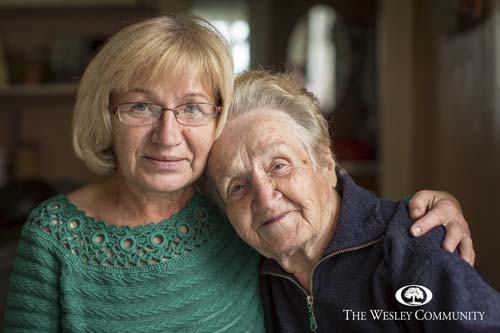Caregivers often struggle with many difficult emotions, from guilt and fear to anger and resentment. Learn more about caregiver guilt and how to manage it.

In a population of people who have given up so much of their lives to care for a loved one, caregivers still experience guilt. Despite giving of themselves to the point of exhaustion, family members who provide care often struggle to find ways to manage their guilt. It’s a common, but difficult, emotion to overcome.
There are a few common reasons why family caregivers feel guilty:
- Lack of time: Many caregivers work outside the home, in addition to caring for their own family. A caregiver may feel like they are not doing enough for any of these segments of their daily life. Guilt is often the result.
- Unqualified: A family caregiver may also worry that they aren’t doing a very good job of caring for their senior loved one. This is especially true if the caregiver is being called on to help with tasks of a clinical nature, such as changing dressings on a wound or administering medications. For an untrained family member, these duties can feel daunting and lead to doubt and guilt.
- Resentment: When the demands of caring for a loved one are all-consuming; a family caregiver may have no time left for themselves. They lose touch with friends and favorite activities. Understandably, it can lead to resentment which, in turn, causes them to feel selfish and guilty.
- Not doing enough: Caregivers may catch themselves thinking they aren’t doing enough for their loved one and should be doing more. The problem is, they don’t really know what more might be. Living with this nagging feeling of not doing enough can translate to guilt.
When you’re burned out and feeling pulled in too many directions, guilt can creep in and make you feel even worse. Taking steps to overcome these negative feelings is crucial.
4 Tips for Managing Caregiver Guilt
- Understand guilt is normal
The first step toward managing caregiver guilt is to understand these are normal feelings. Your fellow caregivers are experiencing the same difficult emotions you are feeling. Be kind to yourself and try to eliminate negative self-talk associated with guilty emotions.
- Connect with fellow caregivers
Find a network of your peers to help you navigate caregiving days will help. Some family caregivers find the support of face-to-face meetings most appealing. If you would like help locating one, call the agency on aging office nearest you.
When your days are overscheduled, an online support group might be an easier solution. The Family Caregiver Alliance is a good resource for making that connection.
- Accept what you can’t control
When you are a caregiver for someone you love, you might think you are responsible for every detail of their life and happiness. Setting that unrealistic expectation for yourself will only lead to more guilt and self-doubt. It’s important to accept that you can’t control everything.
- Make time for positive activities
When guilt begins to work its way into your mind, try to pause for a few minutes to do something positive. A short time-out can help you redirect your attention. Take 10 minutes to walk around the block, practice yoga, meditate, or write in your journal.
Tour The Wesley Community Today
If your role of caregiver is getting to be too much, it might be time to begin exploring senior living options. At The Wesley Community, we offer a full continuum of care. We offer independent living, assisted living, respite services, memory care, and long-term care.
If you aren’t sure what type of care best meets your loved one’s needs, give us a call at (518) 587-3600. One of our experienced team members will be happy to help!

